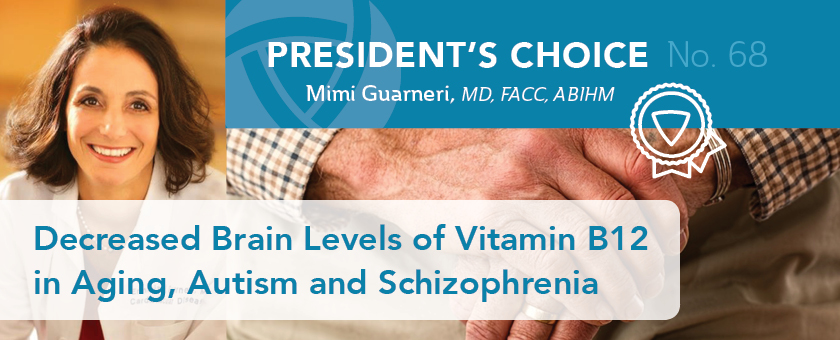
AIHM PRESIDENT’S CHOICE NO. 67: GOOD INFORMATION ON SUGARY BEVERAGE TAX EFFECTS
May 4, 2017AIHM PRESIDENT’S CHOICE: VITAMIN B12 AND BRAIN FUNCTION

Decreased Brain Levels of Vitamin B12 in Aging, Autism and Schizophrenia
This President’s Choice is a newly released interesting research article that has potentially far-reaching implications. Just as the microbiome is increasingly demonstrating a global impact on human physiology and even behavior, methylation function is now recognized for its central role in health and disease. In their article, Decreased Brain Levels of Vitamin B12 in Aging, Autism and Schizophrenia, published by the Public Library of Science, authors Y Zhang, NW Hodgson and MS Trivedi, et al, evaluated a small sample of deceased subjects for brain levels of vitamin B12 (cobalamin) levels across the age span, including a special look at subjects with autism and schizophrenia. As the B vitamins are critical for their role in the methylation process, and vitamin B12 status is compromised in many human health conditions, I read this article with anticipation that another piece of the puzzle regarding root causes of neurodevelopmental and neurodegenerative diseases might be elucidated. Indeed, the authors commented that methylcobalamin (MeCbl, or the methylated form of vitamin B12), “is poised to influence hundreds of SAM-dependent methylation reactions, affecting nearly every aspect of metabolism.”
Just as the microbiome is increasingly demonstrating a global impact on human physiology and even behavior, methylation function is now recognized for its central role in health and disease.

Both MeCbl and adenosylcobalamin were more than 3-fold lower in subjects with schizophrenia and autism than their age-matched controls.
The authors explain that while B12 status in serum has been well researched, their study was the first to attempt to identify pathologically reduced levels of active cobalamin species in the brains of subjects who experienced autism and schizophrenia. While vitamin B12 is synthesized by some bacteria, it must be obtained in the human diet by animal source foods such as meat, dairy, eggs, fish, fortified foods or by nutritional supplementation. Multiple transport proteins and their receptors modulate vitamin B12 activity and facilitate GI absorption and renal reabsorption for its retention. The body conserves B12; it is reabsorbed in the terminal ileum, and very little is excreted. The methylation of DNA and histone proteins regulates gene expression, and epigenetic regulation is especially important during prenatal and early development.43 subjects aged 19 weeks of fetal development through 80 years of age, 12 subjects with autism and 9 subjects with schizophrenia were assessed for frontal cortex levels of 5 cobalamin species. The results showed total cobalamin levels that were significantly lower in older subjects (> 60 yrs of age), despite generally stable blood levels observed in other live patients. Both MeCbl and adenosylcobalamin were more than 3-fold lower in subjects with schizophrenia and autism than their age-matched controls. The lower B12 levels in autistic subjects is interesting because they do not correlate with serum levels of B12, which tend to be normal in autistic patients. A transport mechanism impairment may be the primary issue in this case. It is noteworthy and not altogether unexpected that in autistic subjects, the lower MeCbl levels were associated with decreased methionine synthase activity and elevated levels of its substrate, homocysteine. An additional consideration is that low levels of the antioxidant glutathione have been associated with both autism and schizophrenia, and a mouse study as part of this research article showed that decreased glutathione synthesis was associated with lowered B12 levels, also suggesting a possible transporter mechanism for the apparent deficit. These findings suggest a relationship of B12 status in the brain to antioxidant demand.
 So what does this all suggest?
So what does this all suggest?
The authors conclude that: “Vitamin B12 levels in human frontal cortex decrease with age, especially MeCbl, which plays a crucial role in regulating all methylation reactions, including those providing epigenetic regulation of gene expression. MeCbl deficits in autistic and schizophrenic subjects suggest that impaired methylation may be a critical pathological component of these brain disorders, as well as other neurological and neuropsychiatric conditions. Our findings provide a novel redox/methylation-based perspective on the metabolic systems which support normal brain function across the lifespan.”
This is all very interesting, and we are privileged to have an early opportunity to explore actual brain levels of B12. I have a few questions and comments, though, some of which are noted by the authors as limitations to the study…
- It would be nice to know what the serum levels of B12 and its metabolites were in the same subjects, which could add strength to the suggestion that transport into the brain or receptor function are primary factors in these conditions.
- Other parts of the brain beside the frontal cortex were not sampled, and could be important.
- The normal serum range of B12 is among the widest of all the lab tests we obtain. If the normal range is 180-914 ng/L, perhaps we should be looking at optimal ranges and how they might correlate with brain levels as further study is conducted. I personally get concerned if a B12 level is less than 400-500.
- It is no longer satisfying to use the general population as healthy controls when most of the population is actually unhealthy. This is a confounding factor that I hope to see increasingly recognized in future studies.
- Many factors in ordinary life reduce B12 levels in aging adults: reduced gastric acid, poor diet and common drugs such as metformin and proton pump inhibitors, to name a few. So again, commonly observed reductions of B12 levels in an aging population may be reflective of these factors, rather than a naturally expected decline of B12 levels or their metabolites.
- Attending to robust B12 levels and methylation continues to be important to good health. B12 levels alone are interesting, but how B12 gets methylated, transported and received by its receptors are critical factors that determine B12 activity.
- Biochemical individuality must play a huge role in the expression of neurodegeneration or neurodevelopmental conditions; one biochemical factor is unlikely to be a sole cause for an outcome that must occur in the context of a complex individual.
- There’s way more to this story than my synthesis suggests! As usual, I encourage you to read the entire article with discernment.
I personally feel thankful that those who donated their bodies to science so that we can take another step forward toward understanding preventable factors that cause illness and suffering. It is exhilarating to watch the science unfold as we deepen our knowledge in service of humanity. In the meantime, I’d like to suggest that you learn more about methylation pathways and their impacts on health and disease.
Blessings on your journey,
Mimi Guarneri, MD, FACC, ABIHM
AIHM President



